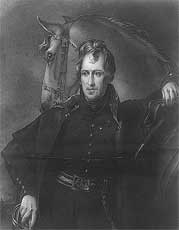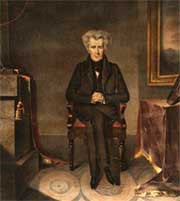Andrew Jackson, the seventh US President (1829-1837), began life on March 15, 1767 in a log cabin on the frontier between the Carolinas. He was the first President not born of wealth, a fact that was not missed by the common people, who loved him. In addition to his presidency, Jackson was known for his military successes and for laying the groundwork for the modern Democratic Party. Because of his toughness and his fiery iron will, he was given the nickname "Old Hickory."

Although he was known as a man of the people, Jackson believed in and promoted slavery and took millions of acres of land from Native Americans. In spite of his popularity, his policies did little to improve the lives of working Americans.
Jackson's father died days before his birth. One brother was killed in the Revolutionary War, while his other brother and mother died of smallpox. At the age of fourteen, Jackson was orphaned. His grandfather had left him an inheritance of $300, which Jackson used to study law. Later he moved to Nashville, Tennessee, where he began a practice. In 1791 he married Rachel Robards, who, although she thought she was divorced, was still married to someone else. The Jackson marriage was re-consecrated when Rachel's divorce was legal.

 In 1796 Andrew Jackson was elected as Tennessee's delegate to the United States House of Representatives. The next year he was called upon to fill the unexpired term of his state's Senator. In 1798 he retired to private life, vowing never to return to politics. Within a few years he was appointed a state superior judge, and from 1804-1812 he worked on his plantation, the Hermitage, raising horses. He was known as a man with a fast temper and was often drawn into fights and duels, many of them over comments about the irregularity of his marriage. In 1796 Andrew Jackson was elected as Tennessee's delegate to the United States House of Representatives. The next year he was called upon to fill the unexpired term of his state's Senator. In 1798 he retired to private life, vowing never to return to politics. Within a few years he was appointed a state superior judge, and from 1804-1812 he worked on his plantation, the Hermitage, raising horses. He was known as a man with a fast temper and was often drawn into fights and duels, many of them over comments about the irregularity of his marriage.
In 1802 Jackson was a general of the Tennessee militia. Jackson fought in the Creek Indian Wars, during which he wrested twenty three million acres of land from tribal peoples. He was given the rank of major general by President Madison and commanded forces in the War of 1812. In 1815, with a mere 5,000 troops, he defeated a British force of 10,000 in the Battle of New Orleans, while sustaining only twenty losses. This was one of the worst British defeats in history, and it made Jackson a national hero.
In 1818, he led an attack against the Seminole Indians and captured Pensacola, involving the United States in conflicts with both Spain and Britain. Jackson claimed that the British were using the town as a base, and he executed two Englishmen for inciting the Indians. His success in Florida influenced Spain to sell the territory to the United States.
In 1819 John Quincy Adams completed the purchase of Florida, and in 1820, Jackson was appointed Governor. In 1823, he was elected Senator from Tennessee, and in 1824 the Tennessee legislature nominated Andrew Jackson for President. Although Jackson received the most votes, he lost the election. Because no candidate had received a majority of the votes, the contest was decided in the House of Representatives. John Quincy Adams was declared the winner amidst allegations that his Secretary of State, Henry Clay, had influenced the election in a "corrupt bargain".

 After that unsuccessful bid, Jackson won the election of 1828 as a Democrat. He and Martin Van Buren were responsible for creating the political organization that was the basis for the modern Democratic Party. Andrew Jackson believed the presidency represented the will of the people, and, as such, should have broad authority. He was widely criticized for expanding the power of the presidency. He was known for rewarding his political supporters with government jobs. When reproached, he responded by claiming he was replacing aristocrats with the common man. It was Jackson who coined the phrase "To the victor go the spoils," and thus the spoils system of politics was born. After that unsuccessful bid, Jackson won the election of 1828 as a Democrat. He and Martin Van Buren were responsible for creating the political organization that was the basis for the modern Democratic Party. Andrew Jackson believed the presidency represented the will of the people, and, as such, should have broad authority. He was widely criticized for expanding the power of the presidency. He was known for rewarding his political supporters with government jobs. When reproached, he responded by claiming he was replacing aristocrats with the common man. It was Jackson who coined the phrase "To the victor go the spoils," and thus the spoils system of politics was born.
The edge was taken off Jackson's victory when, shortly after the election, his wife died of a heart attack. Even though his supporters were wealthy landowners, bankers, and businessmen, to the public Jackson was "the peoples' President." He held meetings in the kitchen of the White House, and those present were called the Kitchen Cabinet.
Jackson vetoed more bills than all previous Presidents combined. His denial of a bill to re-charter a Second Bank of the United States was an important issue in the 1832 election, in which he defeated Henry Clay. States Rights was a volatile issue until Jackson threatened to send federal troops into states that would not collect tariffs. Jackson used these monies to close the Second Bank and pay off the National Debt. Speculation in western lands caused Jackson to issue the Specie Circular, which required all public lands to be paid for with legal tender, which at the time was either gold or silver. This accelerated the Panic of 1837.
Andrew Jackson was loved by the common people and, at the same time, hated by his political enemies, who sometimes referred to him as "King Andrew I." He was a great war hero who became associated with increasing participation of the common man in government; yet his enemies in the Senate accused him of being dictatorial and acting in ways that were unconstitutional. They even voted to censure him, and he was the first President to receive such a rebuke. Jackson and his friends fought for three years before finally having all evidence of the censure removed from the Senatorial Record.
Before the next President Martin Van Buren was sworn into office, Jackson saw that the run on the banks leveled out and did not wipe out the country as anticipated. He was more popular when he left the presidency than he had been when he was elected. His legacy may not match that of the greatest Presidents, but he did strengthen the two-party system through his shrewdness. He also proved that being a common man and a military figure are factors that attract voters.

Andrew Jackson died at his Hermitage plantation on June 8, 1845. Today his portrait is found on the twenty-dollar Bill.
|

